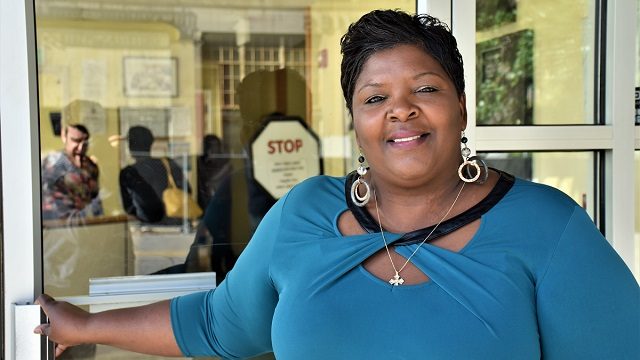By Erica Wright
The Birmingham Times
Welcome to Third Thursdays! This series—published in the Birmingham Times on the third Thursday of every month—highlights area citizens who overcome odds to make a difference in their own lives or those who make a difference in the lives of others.
Sherry Webb grew up in a single-parent home. Because her mom worked, the family didn’t qualify for government benefits. That was something Webb never forgot.
“I always wanted to help people get on the right path,” she said. “I wanted to make a difference, see the change people can make, and make [things] better for the less fortunate. [The way for me to do that] was social work.
Webb, 45, is the director of social services at First Light Shelter in Birmingham, a center downtown that offers an around-the-clock emergency shelter for homeless women and families.
“Homelessness is not something I thought I would be [working with], but that is kind of where my path has taken me,” she said. “When I was in college, I did an internship with a homeless shelter called Bread and Roses, which is now Pathways. I did that for a semester, then when I went back to school to get my masters and interned there again.”
When Webb came to First Light in January 2001, she was as the only social worker.
“This was a brand new agency that had been open for only six months, so there were just two other staff people. We were still serving women, but there was no foundation or real social work structure,” she recalled. “I had to come in and develop [things] from the beginning: create forms, [develop] structure and guidelines, as well as do the social work part of that.”
Being the only social worker was a challenge for Webb.
“I am an African American female, and sometimes it was difficult for someone of a different race [to accept that],” she said. “[For example], you have to get your ID to get housing, and [I was] a black female telling someone that. I also ran into some age challenges because I was in my early 20s when I started, and here I am telling a 50-year-old [what] to do. For the most part, it was a start-from-the-ground-and-figure-out-what-to-do situation.”
First Light
First Light is one of two homeless shelters in the city that offer emergency services and are open 24 hours a day seven days a week.
“When we first started, we were [solely] an emergency shelter; we housed 34 women at that time,” Webb said. “We had a family room with a bed and a crib, so a mom could be in there with her babies. Then we created two more spaces. Now we can house 36 women and a family room.”
As director, Webb, who is also an adjunct professor for the University of Alabama at Birmingham (UAB) Department of Social Work, oversees a staff of seven social workers and handles the administrative aspects of social work. As director, she no longer does direct social work services but handles policies and guidelines to support her staff.
“I develop handbooks and guidelines and the [related] requirements for program participants, as well as policies and procedures,” she said. “Just recently we started a new grant and had to develop those policies and the program design. I do all of our grant renewals, [U.S. Department of Housing and Urban Development (HUD)] programs, and our life skills and groups.”
Humble Beginnings
Webb grew up in Clarke County, Ala., with her mother and six older siblings. Webb’s mother, Rosie, worked for the state of Alabama with the elderly population.
“[My mother] went into their homes and assessed what their needs were, almost like a social worker,” Webb explained. “They did assessments, made sure they had meals prepared, helped them tidy things up, and just sat and visited with the elderly.”
Webb is the youngest of seven (she has three older sisters and three older brothers), so she was both spoiled and protected, she said.
“I got away with a lot of stuff because I was the youngest. I would cry so I wouldn’t get in trouble, but I also became the responsible one that people came to as I grew older,” she said.
When she was 16, Webb and her family moved to Athens, Ala., where she attended and graduated from Athens High School in 1992. After graduating, she attended the University of Montevallo, where she majored in social work.
She now lives in McCalla and has one son, Camden, 17, who is a junior at Hueytown High School and a drummer in the school’s marching band. She is engaged and plans to marry in May; her fiancé’s name is Arthur Bray. To unwind, she likes to binge watch drama shows like “How to Get Away With Murder,” “9-1-1,” or “The Resident.”
“When I have time, I [also] like to do arts and crafts, decorate, and spray paint stuff,” she said. “I like to just be out, [too]. I like to go to the arcade, like Dave and Buster’s, and play the games like basketball and a numbers game they have.”
Finding Her Passion
While working as an intern at the Bread and Roses shelter in Montevallo, Webb found her passion for helping homeless people. After graduating from college in 1996, Webb worked with the Gateway Family Services Alliance program, through which workers would go into homes and provide services, such as parenting, budgeting, and basic living skills.
She stayed with Gateway Family Services from 1997 to 2000 and worked for another social work agency before joining First Light in January 2001. While working at First Light, Webb enrolled at the University of Alabama to get her master’s degree in social work with a concentration in mental health so she could get additional education to help families.
“I went back . . . so I could be better prepared to work with our population of folks,” said Webb, who received her master’s in social work in 2004.
Important Work
Many believe social work mainly involves taking children from homes, but that’s a myth, she said. Part of the job involves assessing a person’s life.
“We look at your housing history, where you’ve lived, and how many times you’ve been evicted so we can assess what type of housing will help. We ask, ‘What kind of income you have?’ ‘Do you have an ID?’ [People] can’t do anything without an ID. My social workers look at medical mental health, too,” said Webb, adding that her team often does very basic work, including helping people with things as simple as hygiene.
“There are some things we take for granted so very often, like knowing to take a bath. Some people’s mental health won’t allow them to do that.”
Part of the work also involves holding clients responsible, Webb said.
“This is an emergency shelter, so your stay is not long. [The average time is] about 65 days, so we [try to see] what we can get done,” she said. “The ladies meet with their social worker every day initially and then … once a week or every two weeks to work on strategies, but we hold [the clients] accountable.”
Webb and her team sincerely believe they can “save the world.”
“We make substantial changes and progress in the lives of the women we touch,” said Webb. “I can see the real difference we make. … If we can take a person from the street, out of bushes, out of burnt housing, and put them with a social worker … we can see that change, 100 percent see that we’re making a difference. That’s why I keep doing it.”
Click here to read more Third Thursday stories: JC Swoopes ;Tomeka Walker; Sherilyn Garner ; Shuanta Woods ;Taria Jackson; Angelia Strode ;Jon Osborne; Vernessa Barnes; Sanchez Tanniehill; Tyrone Tolbert; Rochelle Malone; Reginald Ruffin; Karneshia Patton; Magnolia Cook; Liz Huntley; Annie Avery; Clover Moore; Erica Robbins.
—








